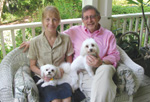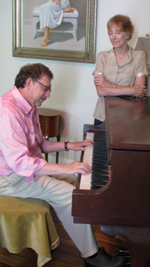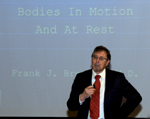|
By
Dawn Brazell
Public Relations
You could say MUSC has its
own Woody Allen now that Dr. Frank Brescia is back.
With the same cynical, dry
wit and penchant for a philosophic take on life, the men share uncanny
similarities. Brescia, M.D., just comes packaged in a medical version
in his roles as oncologist and teacher.
 Dr.
Frank Brescia enjoys a moment with wife Jane and their dogs, Charlie
and Max, on their back porch. Dr.
Frank Brescia enjoys a moment with wife Jane and their dogs, Charlie
and Max, on their back porch.
Brescia returned to MUSC
in April of this year after a short stint in private practice. He left
MUSC in 2007 after his wife had breast cancer and he suffered a heart
attack, thinking he might need a change of pace. What it allowed him to
see is how much he values the camaraderie and intellectual stimulation
of an academic medical institution. Thrilled to be back, he will begin
seeing patients in the fall.
"What I found was that
private practice becomes more about billable hours," he said, in
typical Brescia-style. "You have to wake up in the morning in this kind
of a practice and say, 'This is fun! I want to get up in the morning
and work.'"
No one knows that better
than this native New Yorker who sees critically ill patients all the
time. Colleagues note that he brings his extensive training in
supportive and palliative care in a humorous way that helps many
patients get a new lease of life. Dean Schuyler, M.D., a psychiatrist
who worked with Brescia, recalls Brescia knocking on a door and telling
a patient 'if you're going to complain about something, I'm not coming
in there.'"
Schuyler laughs. Doctors
just don't say that. Unless they are like Brescia.
One of Brescia's true
gifts is his ability to establish rapport, he said. "He's an absolute
marvel with patients. He establishes a relationship with patients that
doctors don't know how to do or they are too busy to do."
Named MUSC's Outstanding
Clinician of the Year in 2003, Brescia has a strong effect on people,
said Schuyler.
"People feel close to him and feel he cares about them and thinks about
them. Frank is an incredibly gifted teacher and engages students on all
levels. He says things and does things that other people won't do.
People go out of their way to make contact with him."
Describing him as one of
the most stimulating people that he knows, Schuyler said he's excited
what he'll do now that he's back. Brescia is interested in palliative
and supportive care and medical ethics, a field experiencing rapid
change and growth. As a visionary, Brescia gets the bigger picture.
Schuyler praises the way Brescia set up a comfort clinic for cancer
patients in 2000. They worked as a team seeing 1,200 patients, with
anyone who wanted to use Schuyler's services being able to without
having to take the time and energy to make a separate appointment.
Brescia said patients
apprecited the clinical trial program. The model gets to the heart of
offering cancer patients more holistic treatment that acknowledges the
complexity of a disease that affects everything from a person's sleep
patterns and sexuality to answering the big end-of-life decisions.
"There are very good
people scattered about this institution who have unique skills. I'd
like to tap into them and figure out how we bring them together.
Programmatically, can we
develop programs that make things easier for patients?" said Brescia.
"You have to be very passionate about how you do this. There's nothing
more important than these things because every one of us faces this at
some time."
Tribal
Member
Brescia doesn't try to sugar coat it. He wasn't the best student early
on in life, and he jokes that his mother said he was the best
contraception there was. Brescia's brother is 16 years younger than he.
Growing up in a tight-knit extended Italian family in New York, Brescia
said it was a fun childhood. His mother was a dressmaker, and his
father worked in construction.
"I always say I grew up in
somewhat of a tribe. You always felt very much part of a larger piece.
You always felt loved. You couldn't go too far, you'd get in trouble.
There was an uncle who would slam you."
Learning to play piano
early, Brescia ended up in a rock and roll group. "We sang and wore
pink jackets. It seemed like a good idea at the time. We were called
Jerome and the Fascinations if you must know. I guess it was like bees
trying to attract the opposite sex. You want to look different."
 Brescia enjoys relaxing at the
piano. Brescia enjoys relaxing at the
piano.
An important part of his
tribe was his grandmother who helped raise him, instilling in him a
love of cooking and roaming New York's Italian neighborhoods to shop
for fresh meat and bread.
"She was a tremendous
influence and a great cook. She was just a terrific woman. She'd take
me down to Broadway in Manhattan. We'd go to the Paramount Theatre and
watch a show, and then we'd go have lunch downtown somewhere in Times
Square. She had the patience of Job."
It was a simple, but good
life, where he learned to be comfortable with the natural ebb and flow
of life. He recalls when his great grandmother died, and she was laid
out in the parlor. "It seemed there was always someone laid out in the
living room, so death wasn't a frightening thing. It was really part of
what went on. It wasn't anything that was strange or frightening."
Seeing education as
important, his father pushed him to do something that was noble such as
medicine. When he was in middle school, he dissected a frog and enjoyed
it and wondered what it would be like to do that with a human body.
"Then I thought, 'I don't
know crap. I'm not getting into any of these good high schools."
He decided he had to get
serious about his studies. High school marked one of the hardest
periods of his life as he struggled to develop the skills, discipline
and financial means to reach his newfound goal. Becoming obsessed with
getting good grades, Brescia began to put himself on another track.
His determination paid
off, with him earning degrees in biology and philosophy from Fordham
University in 1963. His love of philosophy dovetailed nicely with his
interest in oncology and fascination with Woody Allen.
"I'm dealing with medical
oncology, so you're seeing all these existential questions. Is life
meaningless? What does it all matter? What does life mean? You see so
much death. Every day the human drama facing people who are dying
throws this up at you. What's important? You realize that relationships
and all the things that seem kind of a cliche become the issue. It
changes your focus."
Serendipity
Brescia loves the serendipity of life – how the unlikeliest events
ultimately have led him to good places.
Take his service in Vietnam, for example.
Brescia was caught in
limbo after having completed his internal medicine internship at
Cornell University Medical School and being drafted into the war in
1969. He ended up working at Calvary Hospital in New York for a few
months until he was to serve. A hospital that specializes in advanced
cancer and dying, Calvary was to have a profound effect on him.
Patients from Memorial
Sloan-Kettering Cancer Center, where Brescia would end up doing his
fellowship in medical oncology, were sent there to die. "I was amazed
by the care they received at Calvary. I became intrigued by the issue
of what hands-on care meant. I was really taken aback by that.
After service in Vietnam
and finishing his fellowship at Memorial, he went into private
practice. When Calvary built a modern facility and was looking for a
medical director, he applied and held that position for 14 years,
starting the Palliative Care Institute while getting his master's in
philosophy and working with Georgetown University.
Brescia, who would go on
to work at four academic centers before coming to MUSC in 1998, said of
all the honors and awards he's received, his proudest accomplishment is
raising his six children. Brescia has had his hands full parenting,
given his four biological children, one step-son and a daughter he
adopted with his second wife, Jane.
Jane recalls meeting Brescia at Calvary Hospital in New York. He was
part of the first hospice movement in New Jersey, she recalls. She
caught his eye when she was hired to do a management training session
for employees. She brought in an expert on health and humor that had
participants sporting red noses at the end. "Just because you're doing
what you're doing, you don't have to be grim," she said.
That was music to
Brescia's ears.
They became friends, and
though Jane moved to Charleston, their paths were to cross again
following a tragedy in Jane's life after she was struck by a car. As
she was enduring the painful recovery process, she learned her mother,
in Chicago, was dying of breast cancer. Brescia offered to check on her
mother, and then began helping Jane.
He helped her get set up
with a specialist in New York, where she had a specialty surgery and
more physical therapy. "I look like an erector set if you looked at my
X-ray," she said. Brescia became a surrogate father for her son,
Matthew. They married in New York in 1993, blending their two families
and later adopting their daughter.
Other than his penchant
for wearing hideous pumpkin-colored shirts and having a single-minded
focus that makes multi-tasking impossible for him, Jane loves his high
energy and wisdom. "He's funny. He's cynical, but that is part of the
humor. He's very warm and loving. He's very insightful. The kids get so
much wisdom from him."
It's a wisdom gained in
part from the incredible role models Brescia has had and his patients.
He wants to pass that on and find ways to help MUSC students realize
how careful they need to be in this new world of high-tech care to
learn the language of the clinician as well as the language of the
scientist and to know how to sensitively weigh looming questions of
medical ethics posed by patients living longer.
Dr. Frank Brescia lectures to students at MUSC. 
"I've been given by
society an enormous gift to get into people's lives, and I know secrets
about people that no one else even knows—like husbands and wives. So
you have this unique and noble road."
But if doctors never look
up from their computer screen, if they never make a meaningful
connection with the patient, if they fail to realize the connection of
religion, philosophy and medicine, then something essential is lost in
the practice of medicine, he said.
"What you lose now is the
sense of what a physician is. The picture of the physician staying up
all night with a kid at the bedside, where is that? The big word is
abandonment. Who's my doctor? Where is that continuity of care? Who
knows me? We have to be careful how we do this training in this state
of our world, and what it means. They have to appreciate that they are
more than just scientists."
Brescia's Life Lessons
Toughest
obstacle you've faced: Dealing
with Jane's cancer in 2004, particularly since she had the disease I
treat, and my mother's pancreatic cancer in 1999. I felt very
frustrated and helpless. You think you have magical powers when you're
a doctor sometimes, particularly with your own family. You think that
you can ward off things that you can't.
Hobbies: I love music, playing the piano and reading.
Goals on his bucket list: Now that my kids are older, to try to enjoy
those other relationships and figure out how to work and enjoy the
things I love to do. I love New York. We still have a place there.
Favorite view: The view of Central Park from our place in New
York. I love to watch the city, particularly at night, just when the
lights are just going on.
Favorite book: I read a lot of philosophy
and a lot of Woody Allen.
Proudest accomplishment: Raising six kids and all of them being really
good kids.
His religious belief: I want to believe, but I'm not quite sure.
Advice to other doctors: We forget that we are part of this human family
sometimes—that we're no better and no worse. The truth of the matter is
that we're all like Job in some ways. We're all going to be a part of
the bigger questions. And at the end of the day, you hope you're not
going to be alone.
|



 Dr.
Frank Brescia enjoys a moment with wife Jane and their dogs, Charlie
and Max, on their back porch.
Dr.
Frank Brescia enjoys a moment with wife Jane and their dogs, Charlie
and Max, on their back porch. Brescia enjoys relaxing at the
piano.
Brescia enjoys relaxing at the
piano.